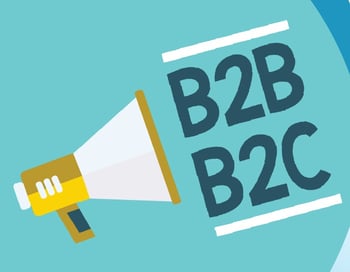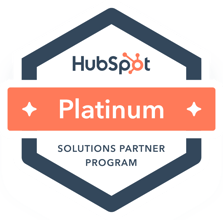 B2B (Business to Business) and B2C (Business to Consumer) marketing is very different. The channels you want to utilize, messaging, frequency, and more are all determined by your audience. While it may not be surprising to know that there are differences between B2B and B2C content marketing, having an in-depth understanding of the differences can substantially impact your marketing's success. Remember, it's not a "one size fits all" approach, so recognizing how to market to different types of audiences is one of the essential factors in building your strategy. To help with this, we have gone through an in-depth review of the four key differences between B2B and B2C marketing to help you analyze and update your current strategy.
B2B (Business to Business) and B2C (Business to Consumer) marketing is very different. The channels you want to utilize, messaging, frequency, and more are all determined by your audience. While it may not be surprising to know that there are differences between B2B and B2C content marketing, having an in-depth understanding of the differences can substantially impact your marketing's success. Remember, it's not a "one size fits all" approach, so recognizing how to market to different types of audiences is one of the essential factors in building your strategy. To help with this, we have gone through an in-depth review of the four key differences between B2B and B2C marketing to help you analyze and update your current strategy.
1. Consumer's Motivation
B2B: What drives your B2B visitors is the value that you offer. Your efficiency and expertise are what a prospect will find most valuable, and their goal is to be educated and equipped with that expertise to help them in their decision-making process. B2B visitors are also driven by statistics and success stories to share with their team.
Moreover, you are not only gaining their trust, but you are also gaining their business. This is the very reason why companies highly value blogs. They are part of their content strategy as they appeal to your B2B visitors and start the selling process even before the actual selling happens. That said, you should focus your content marketing efforts on establishing your brand or your company-affiliated personal brand as a thought leader instead of just hard-selling.
B2C: Your B2C visitors, however, are more likely driven by their emotions. They want to be entertained and satisfied with their purchase. That said, you can better leverage stories since they can easily pull emotional triggers – those that drive the consumption of a B2C customer. You can weave your product/service into those stories that play into their emotions.
At the same time, it must be noted that a B2C customer also looks for something that can solve their problem – and that's what matters. Your product or service should always have an answer to their particular need or concern. And bonus points if you are an industry leader.
2. Content Strategy
B2B: In a B2B environment, the primary goal is ROI. What matters is the factual data, the numbers, and the tangible features you can offer. The informative ads and promotional content concentrate on the 'what, why, and how' of business processes. Appealing more to complex data vs. emotions wins in a B2B environment.
Meanwhile, though highly encouraged more in a B2C environment, stories can also be beneficial in a B2B environment if they are backed up with facts, numbers, graphs, and other materials that focus on data and demonstrate ROI. This applies to website content, blog posts, and articles you publish as part of your content marketing strategy.
B2C: The main drivers of B2C content marketing efforts include blog posts, the content on your website, your social media posts, and every other piece of content that you publish with the B2C market's emotions in mind. An example of emotional and straightforward would be Apple's marketing copy for every new product they launch.
The best content-based campaigns involve stories that are told strategically. Stories are the best platforms for emotional triggers, drive the B2C market's consumption, and are easily relatable.
Disclaimer: It's not often the case that one should strictly stick only to emotions or data. Both emotions and data play an essential part in both environments. Think Apple, which has the right balance of data and emotions. It's just that the ratio differs for B2C (wherein you have to appeal more to emotions) and B2B (wherein you have to appeal more to data that reflect ROI).
3. Personas
B2B: B2B marketing is usually focused on a small set of personas who all value the same thing, so your content marketing efforts aimed at B2B should again be very focused on things like data, trends, and ROI.
B2C: B2C marketing is usually focused on many different types of consumers, even within a small niche, meaning B2C requires accounting for many different personas. For instance, if you're selling protein supplements to bodybuilders, you have to account for all types of bodybuilders, from the pros to newbies, male and female, young and old, and more. Your product catering to all of them does not necessarily mean your content will appeal to them all. When you are marketing to them, you have to consider each persona's specific concerns and needs. You must first categorize your consumers into defined classes that identify the personas you cater to and find the right time, emotion, and appeal for each. Each will determine a unique content strategy.
4. Decision-Making Process
B2B: B2B has a lengthier decision-making process since it involves more stakeholders than B2C. B2B also requires investing time in cultivating a relationship and pursuing a partnership with the potential buyer. This may mean offering multiple resources or making numerous phone calls to more than one person within a company, or formally presenting a proposal. It is unlikely for a company to choose a B2B partner on a whim. To land on your prospects regardless of who they may be, take the time to learn who the key decision-makers are and do everything in your power to make it easy for them to say "Yes" to your pitch.
B2C: B2C takes a relatively shorter decision-making process since you will often speak to one person, two at most. B2C will primarily sell to customers who make their purchasing conditions at the moment. This, in return, makes your in-the-moment marketing crucial. You will have to catch the attention of your target market and generate immediate need and desire for your product. Given this, a large pool of prospective purchasers is a more intelligent and practical aim since there will always be a certain percentage of leads that decline.
Need help getting started? We invite you to speak with one of our inbound marketing experts today. We'll discuss your current initiatives, strategy, and even the process you have outlined to ensure it's a success.



.png?width=80&height=80&name=diamond-badge-color%20(1).png)





.png?width=250&name=diamond-badge-color%20(1).png)
